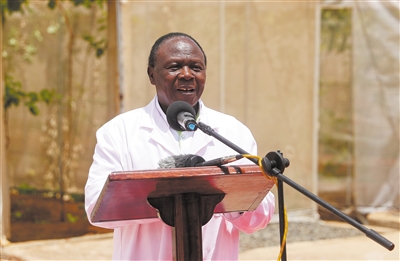
 Luban Workshop Empowers Thai Youth
Luban Workshop Empowers Thai Youth China Leads in IP Filing Across All Indicators
China Leads in IP Filing Across All Indicators Tibetan Plateau Scientific Expedition:
Tibetan Plateau Scientific Expedition: Shenzhou-15: A Leap Forward for China's Space Station
Shenzhou-15: A Leap Forward for China's Space Station Space Exploration Needs More Int'l Cooperation
Space Exploration Needs More Int'l Cooperation Chinese Scientists Help Boost Maize Harvest in Kenya
Chinese Scientists Help Boost Maize Harvest in Kenya WEEKLY REVIEW
WEEKLY REVIEW ITER's First Wall Panel Good to Go
ITER's First Wall Panel Good to Go WECHAT ACCOUNT& E-PAPER
WECHAT ACCOUNT& E-PAPER
 |
| David Mburu, principal of the College of Agriculture and Natural Resources at JKUAT, delivers a speech at the ceremony for the harvest of white maize variety. (PHOTO: XINHUA) |
White maize is one of the staple foods of Kenyans, but the country's production can't meet its population growth. In addition the region is facing food shortages due to decreasing production caused by the recent drought in the Horn of Africa, said David Mburu, principal of the College of Agriculture and Natural Resources at Jomo Kenyatta University of Agriculture and Technology (JKUAT).
For Mburu, the bumper harvest of white maize in the agriculture demonstration area of Sino-African Joint Research Center (SAJOREC) is no doubt good news. The harvest means a lot for Kenya and other African countries, he said.
In April 2022, scientists from Chinese Academy of Sciences (CAS) and JKUAT began the trial planting of a local maize variety. Five months later, the maize planted in SAJOREC demonstration area matured at the right time, and its yield is about 50 percent higher than the similar varieties in surrounding areas.
Mburu said, "It is a variety that can grow well in low rainfall areas," adding that the college will do its best to cooperate with SAJOREC to expand the scale of trial planting and conduct in-depth research on drought and insect resistance to further increase the yield.
According to SAJOREC, more than 45 joint research programs have been put forward since its establishment in 2013, focusing on biodiversity investigation, pathogenic microorganism detection, geographic science and remote sensing, high-yield and high-quality crop cultivation demonstration, and land and water resources management.

 Next
Next



